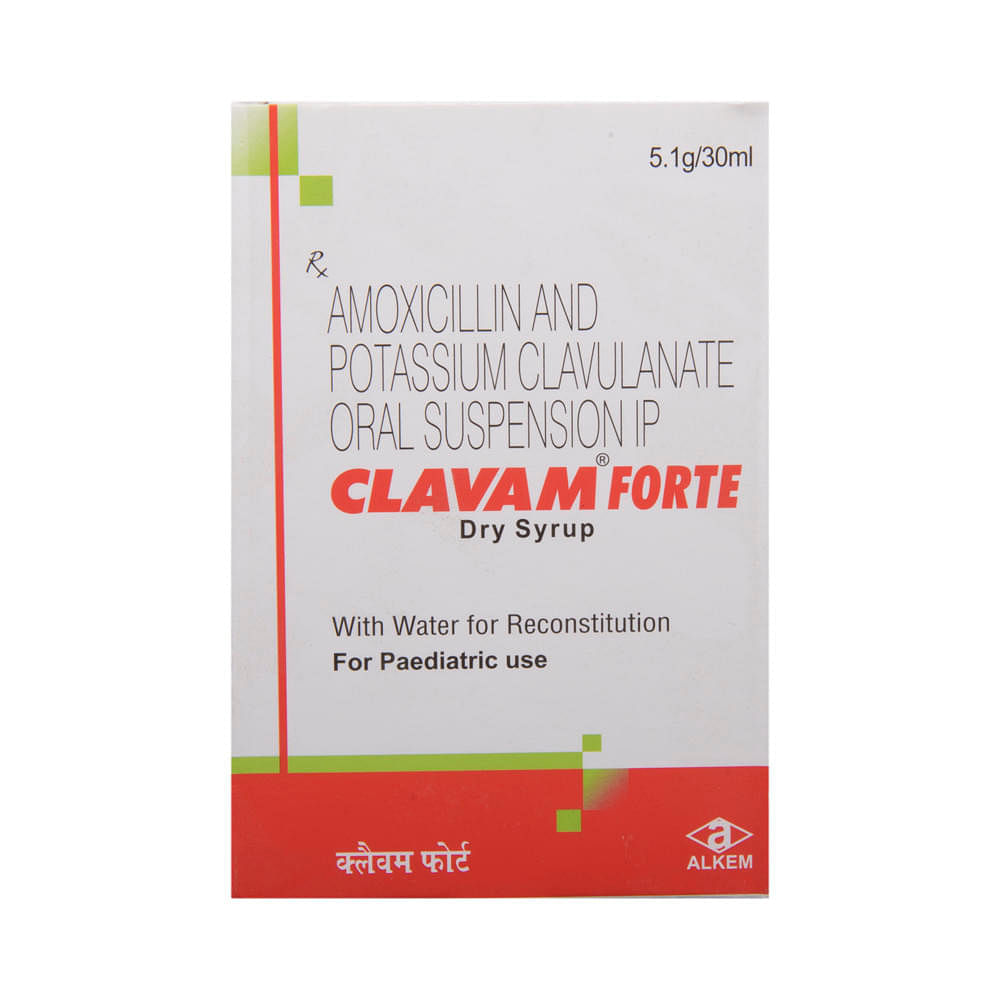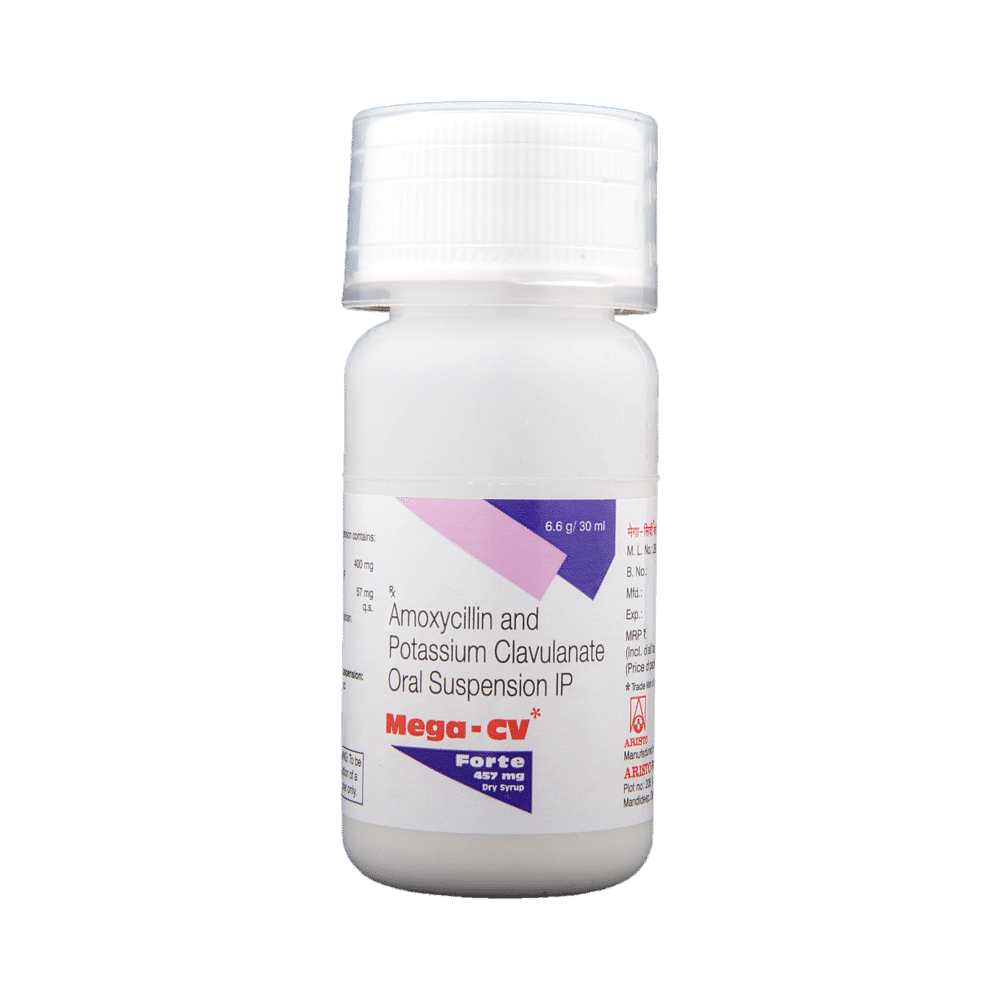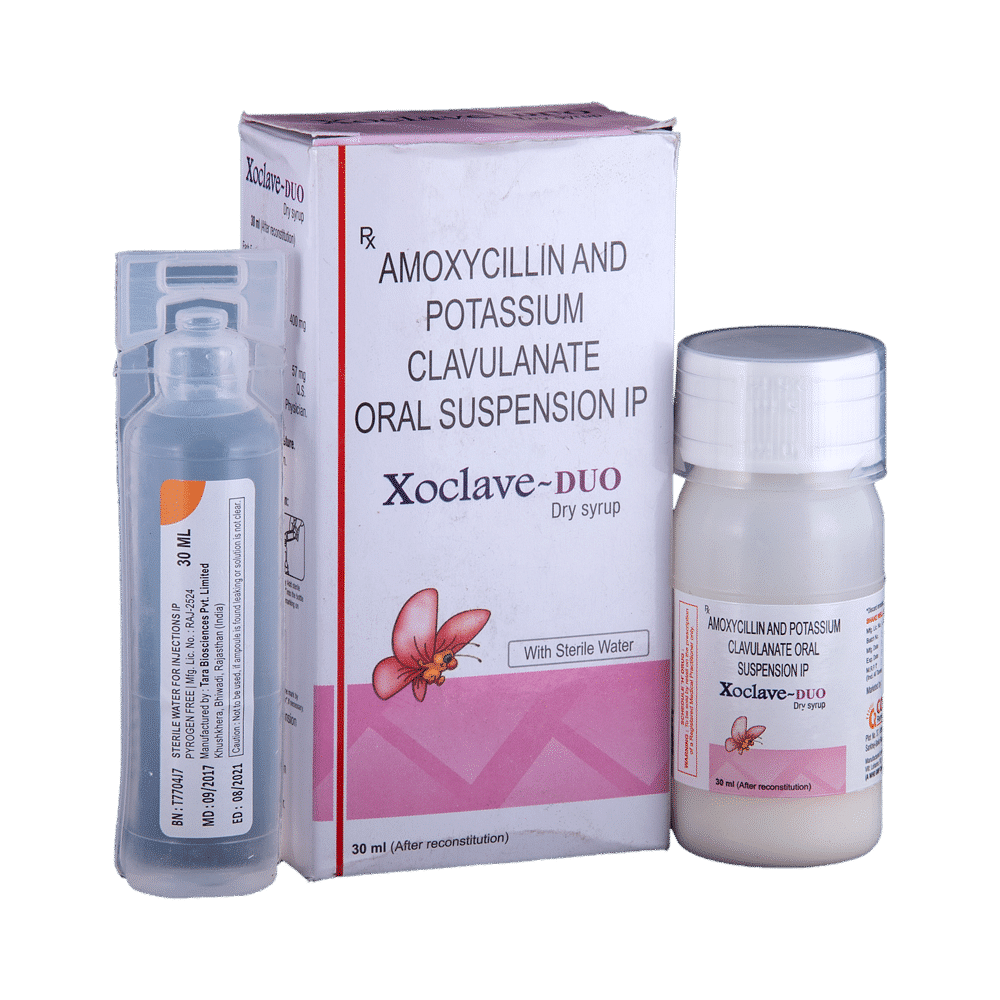
Clavgic Forte Dry Syrup
Manufacturer
Neorangic Healthcare Private Limited
Salt Composition
Amoxycillin (400mg/5ml) + Clavulanic Acid (57mg/5ml)
Key Information
Short Description
Clavgic Forte Dry Syrup is an antibiotic medicine that helps treat bacterial infections of the ear, nose, throat, chest, lungs, teeth, skin, and urinary tract.
Dosage Form
Dry Syrup
Introduction
Clavgic Forte Dry Syrup is an antibiotic medicine that helps treat bacterial infections of the ear, nose, throat, chest, lungs, teeth, skin, and urinary tract. It is capable of killing bacteria that have become resistant to other therapies and thus also helps treat tuberculosis that is resistant to other treatments.
Directions for Use
Your child must complete the entire course of antibiotics. Stopping too soon may cause the bacteria to multiply again or cause another infection.
How it works
Clavgic Forte Dry Syrup is an antibiotic. It has two active agents amoxycillin and clavulanic acid. Amoxycillin works by preventing the formation of the bacterial protective covering (cell wall) essential for the survival of the bacteria. Whereas clavulanic acid serves a special purpose of inhibiting an enzyme (beta-lactamase) that is produced by resistant bacteria. This makes the combination of amoxycillin and clavulanic acid an effective line of treatment for many types of infections.
Quick Tips
Your child must complete the entire course of antibiotics. Stopping too soon may cause the bacteria to multiply again or cause another infection. Your child may have a bitter taste in the mouth after the intake of Clavgic Forte Dry Syrup. Eating citrus fruit or sipping plenty of water or fruit juice may help. Encourage your child to drink plenty of water in case diarrhea develops as a side effect. Never give Clavgic Forte Dry Syrup until and unless prescribed by the doctor. Do not give Clavgic Forte Dry Syrup to treat common cold and flu-like symptoms caused by viruses. Never save medicine for future illnesses. Check ‘expiry’ before giving Clavgic Forte Dry Syrup to your child. Immediately discard all the expired medicines. Stop Clavgic Forte Dry Syrup immediately if your child develops an itchy rash, facial swelling, or breathing difficulty. Report to the doctor without any delay.
Related Medicines

Clavam Forte Dry Syrup

Mega-CV Forte 457mg Oral Suspension

Amoxytill CV Dry Syrup

Xylomox CV Dry Syrup

Agunex CV DS Dry Syrup

Xoclave -Duo Dry Syrup

Selluxy Forte Dry Syrup

Omclav Duo Dry Syrup

Altramox CV DS Dry Syrup

Moxinem CV DS Dry Syrup
Frequently asked questions
Can other medicines be given at the same time as Clavgic Forte Dry Syrup?
Clavgic Forte Dry Syrup may interact with other medications or substances. Before starting this medication, tell your child's doctor about all other medications your child is taking. It’s essential to consult a healthcare professional for guidance regarding the use of medications during treatment.
Can I get my child vaccinated while on treatment with Clavgic Forte Dry Syrup?
Antibiotics usually do not interfere with vaccines or cause adverse reactions. However, children should avoid getting vaccinated until they have recovered from the underlying illness. Once your child feels better, the vaccine can be administered after consulting a healthcare professional.
Which lab tests may my child undergo while taking Clavgic Forte Dry Syrup on a long-term basis?
Periodically, doctors may check for kidney and liver function to assess the effect of the long-term treatment. This helps track your child’s health during prolonged therapy.
Can I give a higher than the recommended dose of Clavgic Forte Dry Syrup to my child?
Never exceed the recommended dosage of this medication as it can increase the risk of side effects. If your child experiences worsened symptoms, consult a healthcare professional for further evaluation.
Can I stop giving Clavgic Forte Dry Syrup to my child when the symptoms are relieved?
Do not discontinue medication without consulting a doctor unless you have completed the entire course of treatment. While your child may show improvement in symptoms, full recovery might not be achieved until the complete course is finished. Continue following your healthcare professional’s instructions.
Can the use of Clavgic Forte Dry Syrup cause diarrhea?
Yes, Clavgic Forte Dry Syrup may cause diarrhea as it can disrupt the balance of bacteria in the child's gut. To manage diarrhea, encourage your child to consume plenty of fluids. Seek medical advice if diarrhea persists and you notice any signs of dehydration, such as decreased urination with dark-colored and strong-smelling urine. Do not administer any additional medication without consulting a healthcare professional.
Do all viral common colds result in secondary bacterial infection?
Most viral colds do not lead to secondary bacterial infections. It’s crucial to avoid prescribing antibiotics for viral infections as it can worsen your child's condition and potentially create antibiotic resistance. Seek medical advice from a healthcare professional before administering any medication.
The mucus coming out of my child’s nose is yellow-green. Is it a sign of a bacterial infection?
Yellow or green mucus in the nose is not a guarantee that your child needs antibiotics. During a common cold, mucus thickens and may change color from clear to yellow or green. Symptoms usually last for 7-10 days.
Is there any sign which shows that my child needs immediate medical attention?
Seek immediate medical attention if your child experiences allergic reactions (breathing problems, skin rashes), gastrointestinal issues (diarrhea) and liver damage (weakness, paleness, vomiting). These potential side effects are serious and require professional care. Consult a healthcare provider immediately.


